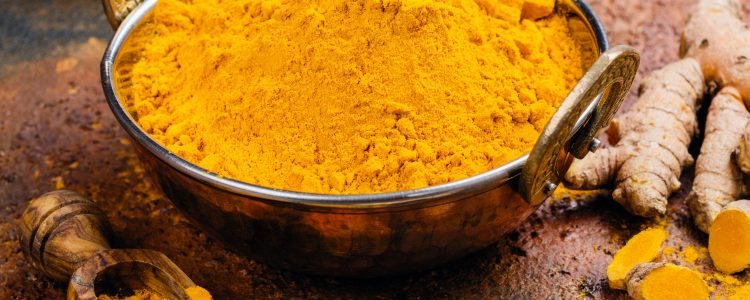Turmeric

A few clients have been asking about Turmeric – or more accurately – Curcumin, as a therapeutic anti-inflammatory for joint conditions, and as it is currently enjoying an explosion of research, I thought it worth a closer look –
Turmeric is a plant belonging to the ginger family, whose root provides the bright yellow Indian spice that lends its colour and slightly bitter taste to curries. Curcumin is the primary active ingredient extracted from the Tumeric root and rhizome. This is a polyphenol with a long history of Ayurvedic medicinal use. As a ‘nutraceutical’ it is now being extensively researched, with over 1,000 studies in 2014 alone. It is non-toxic, with established digestive, antioxidant, antiseptic and anti-inflammatory therapeutic properties. Additional associations could now include anticancer, antiviral, and antibacterial activities – as indicated with over 6,000 citations.(1)
It has a long history of therapeutic uses for many conditions; heartburn, stomach/intestinal discomfort, loss of appetite, liver problems and gallbladder disorders. Some people find it effective for headaches, respiratory infections, fibromyalgia, fever, menstrual problems, water retention, worms and kidney problems. Some apply it as a poultice for eye infections, ringworm, bruising, inflammatory skin conditions, oral soreness and as anti-microbial for infected wounds.(2)
Current research includes its potential to augment chemotherapy.(3,4) Studies have shown it has potential for the management of inflammatory bowel disease (5) and studies are ongoing for its effectiveness for patients with psoriasis, inflammatory eye diseases, rheumatoid arthritis, pancreatitis and hyperlipidemia.(6) Research is currently looking at its ability to modulate the immune system, both to enhance antibody responses and down-regulate auto-immune dysfunction.(7,8) Curcumin may reduce clotting factors in blood so should be avoided for 2 weeks prior to any surgery and not used in conjunction with blood-thinning medication like Warfarin or Heparin.(1) Curcumin can make some gallbladder problems worse so should be avoided with gallstones or gallbladder obstructions.
C U R C U M I N S U P P L E M E N T S
Curcumin is poorly absorbed by the body so some supplements may contain what appear to be high doses. However, 8 g / day have been shown to produce no toxicity in trials.(8)
In terms of available supplements, several brands combine Curcumin with other complimentary phytonutrients, offering a broad range of antioxidant capabilities, but I favour Bonusan’s ‘Curcuma Longa’, which is a little more expensive compared with other brands, but crucially maximises absorption. This is relevant because the basic extract Curcumin is notorious for being poorly absorbed. I hate the idea of 80% of something so valuable passing straight through you! Bonusan achieve improved absorption with biocurcumin, a complex made with bioactive cucuminoids, sesquiterpenoids and ar-tumeron from the essential oil of curcuma longa, increasing its absorption sevenfold and its retention time significantly, keeping it active in the body 3 times longer.
So this golden extract deserves its spot in the limelight, and for those with chronic inflammatory conditions, it just might offer the opportunity to reduce reliance on over the counter anti-inflammatories with all their (long-term-use) side effects.
.
